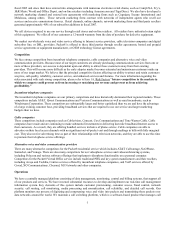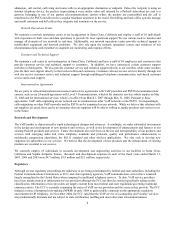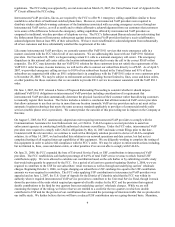8x8 2007 Annual Report Download - page 19
Download and view the complete annual report
Please find page 19 of the 2007 8x8 annual report below. You can navigate through the pages in the report by either clicking on the pages listed below, or by using the keyword search tool below to find specific information within the annual report.Our products must comply with industry standards, FCC regulations, state, local, country-specific and international
regulations, and changes may require us to modify existing products and/or services.
In addition to reliability and quality standards, the market acceptance of telephony over broadband IP networks is dependent
upon the adoption of industry standards so that products from multiple manufacturers are able to communicate with each other.
Our VoIP telephony products rely heavily on communication standards such as SIP, MGCP and network standards such as
TCP/IP and UDP to interoperate with other vendors' equipment. There is currently a lack of agreement among industry leaders
about which standard should be used for a particular application, and about the definition of the standards themselves. These
standards, as well as audio and video compression standards, continue to evolve. We also must comply with certain rules and
regulations of the Federal Communications Commission (FCC) regarding electromagnetic radiation and safety standards
established by Underwriters Laboratories, as well as similar regulations and standards applicable in other countries. Standards
are continuously being modified and replaced. As standards evolve, we may be required to modify our existing products or
develop and support new versions of our products. We must comply with certain federal, state and local requirements regarding
how we interact with our customers, including marketing practices, consumer protection, privacy, and billing issues, the
provision of 911 emergency service and the quality of service we provide to our customers. The failure of our products and
services to comply, or delays in compliance, with various existing and evolving standards could delay or interrupt volume
production of our VoIP telephony products, subject us to fines or other imposed penalties, or harm the perception and adoption
rates of our service, any of which would have a material adverse effect on our business, financial condition or operating results.
Our ability to offer services outside the U.S. is subject to the local regulatory environment, which may be unknown,
complicated and uncertain.
Regulatory treatment of VoIP telephony outside the United States varies from country to country and often the laws are
unclear. We currently distribute our products and services directly to consumers and through resellers that may be subject to
telecommunications regulations in their home countries. The failure by us our customers and resellers to comply with these
laws and regulations could reduce our revenue and profitability. Because of our relationship with the resellers, some countries
may assert that we are required to register as a provider in that country. In such case, our failure to do so could subject us to
fines or penalties. In addition, some countries are considering subjecting VoIP services to the regulations applied to traditional
telephone companies. Regulatory developments such as these could have a material adverse effect on our international
operation.
Future legislation or regulation of the Internet and/or voice and video over IP services could restrict our business,
prevent us from offering service or increase our cost of doing business.
There are an increasing number of regulations and rulings that specifically address access to commerce and communications
services on the Internet, including IP telephony. We are unable to predict the impact, if any, that future legislation, legal
decisions or regulations concerning the Internet may have on our business, financial condition, and results of operations.
Regulation may be targeted towards, among other things, assessing access or settlement charges, imposing taxes related to
internet communications and imposing tariffs or regulations based on encryption concerns or the characteristics and quality of
products and services, any of which could restrict our business or increase our cost of doing business. The increasing growth of
the broadband IP telephony market and popularity of broadband IP telephony products and services heighten the risk that
governments or other legislative bodies will seek to regulate broadband IP telephony and the Internet. In addition, large,
established telecommunication companies may devote substantial lobbying efforts to influence the regulation of the broadband
IP telephony market, which may be contrary to our interests.
Many regulatory actions are underway or are being contemplated by federal and state authorities, including the FCC and other
state and local regulatory agencies. On February 12, 2004, the FCC initiated a notice of public rule-making to update FCC
policy and consider the appropriate regulatory classification for VoIP and other IP enabled services. On November 9, 2004, the
FCC ruled that Vonage DigitalVoice and similar services are jurisdictionally interstate and not subject to state certification,
tariffing and other common carrier regulations. This ruling was subsequently appealed by several states. On March 21, 2007,
the United States Court of Appeals for the 8th Circuit affirmed the FCC’s declaratory ruling.
There is risk that a regulatory agency requires us to conform to rules that are unsuitable for IP communications technologies or
rules that cannot be complied with due to the nature and efficiencies of IP routing, or are unnecessary or unreasonable in light
of the manner in which Packet8 offers service to its customers. It is not possible to separate the Internet, or any service offered
over it, into intrastate and interstate components as we currently have no means to automatically identify the physical location
of one of our subscribers on the Internet. While suitable alternatives may be developed in the future, the current IP network
does not enable us to identify the geographic nature of the traffic traversing the Internet.
17
























